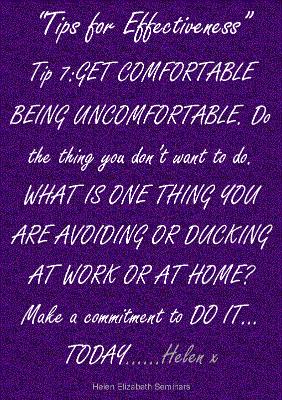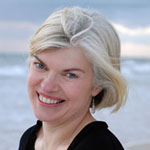Want to be more effective in improving yourself?
Here are 20 tips by Helen Elizabeth that will save you time and money
Helen provides 20 tips for effectiveness, making the most effective use of your time and working smarter, not harder.
Most of us are interested in improving something about ourselves: our productivity, our sanity, our organization, our happiness, our effectiveness, our impact on the environment, our minds, our dreams.
And you can spend hundreds of dollars on books and thousands of hours on websites looking for your answers.

Are you usually punctual or late? Do you finish things within the time you stipulate? Do you hand in your reports/work on time? Are you able to accomplish what you want to do before deadlines? Are you a good time manager?
If your answer is “no” to any of the questions above, that means you’re not managing your time as well as you want. Making the most effective use of your time requires planning and then sticking to the plan – and that takes discipline.
Here are Helen’s 20 Tips…
1. Know your purpose and your priorities (both professionally and personally). Reflect and write down what they are. CLARITY is POWER.
2. Focus on the essential and important at work and home. What is RIGHT ACTION NOW? What is the best use of my time and energy in this moment?
3. Value your time. Think about your time as money “Buy yourself” some time. … can you “contract out” things outside your work that take so much time …cleaning, gardening, preparing for entertaining, child care etc
4. Get out of the office: have at least 30 minutes away. Get some fresh air.
5. DECLUTTER your workspace and your home. If this is a major project commitment to only 15 minutes a day… one draw, one shelf, one surface at a time.
6. Put YOU in your diary. If a meeting is in your diary you attend it. You do not renig on your commitments to others, but many of us renig on our commitment to ourselves by not putting OURSELF in our own diary
7. GET COMFORTABLE BEING UNCOMFORTABLE. Do the thing you don’t want to do. WHAT IS ONE THING YOU ARE AVOIDING OR DUCKING AT WORK OR AT HOME? Make a commitment to DO IT… TODAY.
8. Learn how to say “NO” We cannot be effective if we take on too much. DEFINE WHAT IS IMPORTANT AND KNOW YOUR BOUNDARIES in both your professional and personal life
9. Curb your perfectionist tendencies. Recognise “the point of diminishing return” in your tasks or projects and set time limits and don’t do the extra hours to make it “perfect”.99% of the time it is not necessary or noticed.
10. Have more realistic time estimations to complete tasks or projects (double the time you think things will take). “Under promise and over deliver”.
11. Use your diary (outlook, phone or other system) to write down everything you need to do so it is not running around your head and schedule times to complete if possible
12. A very simple system have used: I have two A4 ring pads… one for my work and one for my personal life. At the back of each I have a “master-list” where I write down all the big and small tasks, projects, in-completions etc all the things that are in my head. At the front I have a “to do” list for each day, which is achievable and manageable. Every week I go to the master-list at the back and cross off items completed. The master-list is an ongoing list that is being added to all the time. Again, it gets the clutter out of my head and eventually I get to everything on the list. Life is an ongoing project!
13. When you wake up, before you get out of bed, SPEND THE FIRST 5 MINUTES OF THE DAY IMAGINING YOUR DAY GOING EXACTLY AS YOU WANT IT TO BE, imaging the very best outcome in all scenarios…use the power of visualisation to increase your effectiveness and create your day!
14. Stop comparing yourself with others. Appreciate your unique set of skills, qualities and strengths. Write a list of them. Get feedback from others
15. Observe your thoughts and detach from the negative or unproductive ones. YOUR THOUGHTS CREATE YOUR FUTURE
16. Have at least 15 minutes to yourself, or by yourself daily. We all need time for rest, renewal, rejuvenation….
17. Breathe consciously, breathe in energy, breathe in effectiveness, breathe a way frustration, anger, breath away the thoughts that limit your effectiveness, breathe in calm. Be MINDFUL in all things.
18. When overwhelmed and overtired be still, be silent, breathe for 2 minutes before doing anything
19. Focus on your achievements daily. WHAT WE FOCUS ON EXPANDS Write 5 “acknowledgements” at the end of the day of what you have done or achieved, especially on the days when you think you have achieved nothing on your “to do” list, or feel frazzled or stressed by too much too do. On those days your achievements might look like…. “I acknowledge myself for not snapping at my boss” “I acknowledge myself for making that phone call I have been procrastinating about” “I acknowledge myself for assisting my colleague for 30 minutes”.
20. Live in the NOW! Appreciate the small, wonderful things in life and savour and be grateful for the moments!
This guest post is by Helen Elizabeth of Helen Elizabeth Seminars.
© Helen Elizabeth Seminars 2013 – Published with permission.
~~~~~~~~~~~~

About Helen Elizabeth
Helen Elizabeth Seminars has been operating since 2003 and is headed by Helen Elizabeth Alm, who has been a trainer, facilitator, adult educator, presenter and coach, since 1987. Helen is an expert in educating and empowering change in organizations, teams and individuals.
Knowing how to be effective is one of the most important steps in rebuilding your relationship.
When you’re trying to fix your relationship but your emotions are out of control, you will always end up fighting. It’s time to get some professional help.
You can change this today.
I can help you to:
- Grow your emotional skills – emotional skills are far more important than any functional skill in achieving a high level of peace and calm within oneself.
- Know your emotional style – your emotional style effects how you react in emotional situations.
- Understand your emotional brain – learn how your brain effects your personal emotions.

